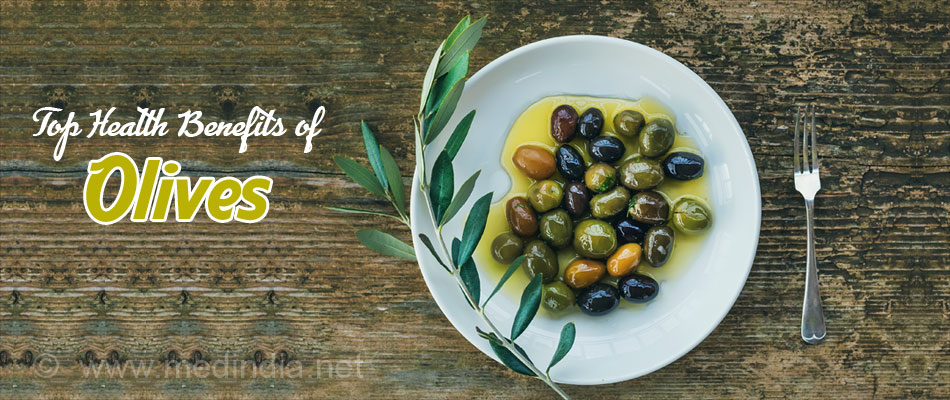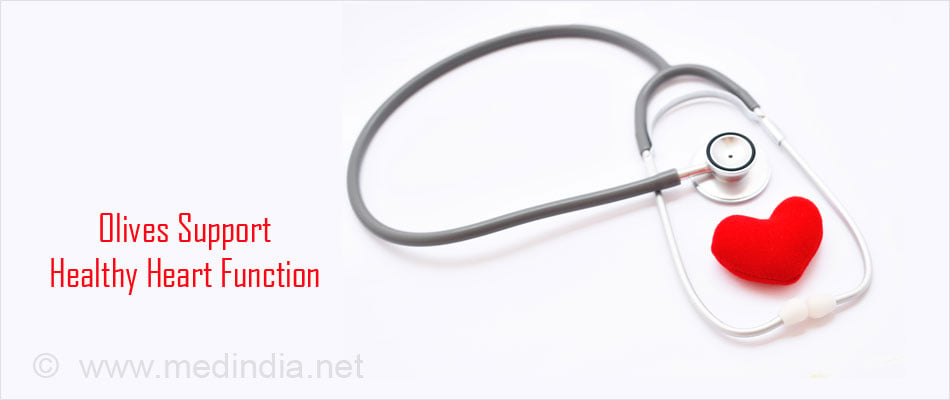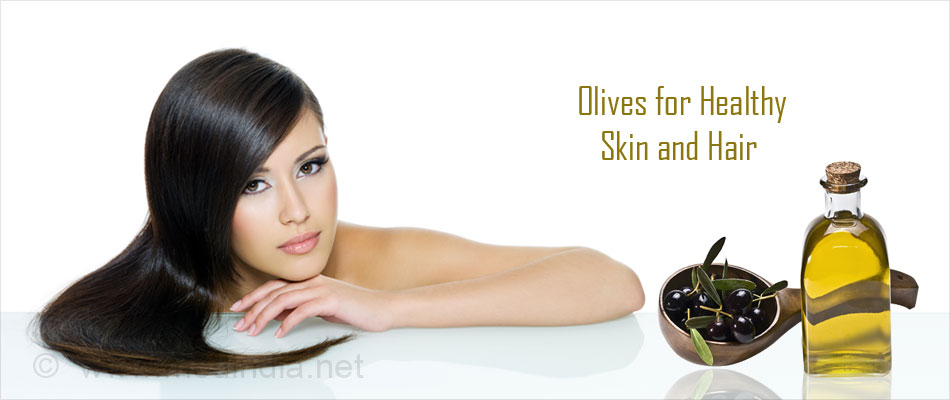- Olives, ripe, canned (small-extra large) - (https://ndb.nal.usda.gov/ndb/foods/show/2281?fgcd=&manu=&lfacet=&format=&count=&max=50&offset=&sort=default&order=asc&qlookup=olive&ds=standard+reference)
- Olive oil may benefit your bone health - (https://www.iofbonehealth.org/news/olive-oil-may-benefit-your-bone-health)
- Dietary Fat Intake and the Risk of Depression: The SUN Project - (http://journals.plos.org/plosone/article?id=10.1371/journal.pone.0016268)
- How to Preserve Olives - Easily! With Step-by-step Directions, Photos, Ingredients, Recipe and Costs - (http://www.pickyourown.org/canningolives.php)
- Olives and Bone: A Green Osteoporosis Prevention Option - (https://www.ncbi.nlm.nih.gov/pmc/articles/pmc4997441/)
Health Benefits of Olives
The olives or the Olea europaea is associated with the Mediterranean cuisine. Olives are harvested in the green to purple stage and is the source of olive oil. Raw or fresh olives are naturally very bitter and they have to be cured and fermented. Before the ripening cycle olives are green and on full maturity it turns to shades of purple, brown or black. It is considered a good source of iron and is beneficial for eyes. It is indicated for osteoporosis and cancer prevention. It has antioxidant and anti-inflammatory properties.
Nutrient-rich Olives
Olives constitute 80% water and has about 17% dietary fiber. The key phytonutrients present in olives are phenols, terpenes, flavones, hydroxycinnamic acids, anthocyanidins, flavonols, hydroxybenzoic acids, hydroxyphenylacetic acids.

Fight Against Cancer
Vitamin E and treasure house of phytonutrients, serve as antioxidants that combat oxidative stress. It increases blood levels of glutathione which is body’s main antioxidant nutrient. Oleuropein, a phenolic compound in olive leaves can decrease oxidation of LDL (low-density lipoprotein) cholesterol. Antioxidant phytonutrients in olives provide DNA protection.
Olives and olive oil are considered as anti-cancer agents as triterpene phytonutrients in olives like uvaol, erythrodiol, and oleanolic acid; help to interrupt the life cycle of breast cancer cells. Olives can also interrupt the life cycle of gastric cancer. A study, by the team of researchers from Rutgers University and Hunter College, published in the journal Molecular & Cellular Oncology showed that oleocanthal (a phenolic compound) induced the loss of cell adhesion within 30 minutes on prostate, breast, and pancreatic cancer cells and made them non-viable within 24 hours by destroying lysosomes.
Aid in Digestion
Olive oil promotes the secretion of bile and pancreatic hormones. A cup of olives contains around 15% of the daily allowance of fiber which is important for digestion.Olives contain 80% MUFA which is a healthy source of dietary fat. High fiber and MUFA present in olives and olive oil provide satiety and reduce the chances of overeating or snacking.
Improve Heart Health
Though olives are rich in fat they play a role in aiding heart function. Oleic acid found in olives is known to lower blood pressure. Phenolic compounds like hydroxytyrosol serve as anticoagulants to thin the blood and prevent plaque build-up. It reduces the risk of atherosclerosis and increases good cholesterol. The antioxidant nutrients present in olives hinders the oxidation of cholesterol and promotes healthy lipid profile.

Relieve Inflammation
Olives have anti-inflammatory properties as it relieves inflammation in joints, muscles, tendons and injuries. It can block histamine receptors called H1 receptors; lowers levels of leukotriene B4 (LTB4); lowers blood levels of C-reactive protein (CRP); and reduces activity in arachidonic acid pathway. Inducible nitric oxide synthase or iNOS is an enzyme whose overactivity has been associated with inflammation. Oleuropein can decrease the activity of iNOS. Olives are essentially an anti-inflammatory food and reduce allergy. Oleocanthal has shown similar anti-inflammatory effect as that of ibuprofen.
Promote Eye Health
The U.S. Recommended Dietary Allowance (RDA) for Vitamin A is up to 3,000 IU. Around 100 grams of olives contain 400 IU of Vitamin A. Vitamin A is effective against macular degeneration, cataracts, glaucoma and other age-related ocular diseases. Vitamin A gets converted into the retinal form and promotes eye health.
Healthy Skin & Hair Care
Olives being a rich source of Vitamin E and MUFA serves to promote healthy skin and hair growth. Olives and olive oil can be used externally and internally to promote healthy skin. Olive oil can be added to coconut oil for external application on hair. Olive oil can be a good skin moisturizer.

Prevent Osteoporosis
According to a study by Kok-Yong Chin and team, olive oil, olives are potential dietary interventions for prevention of osteoporosis. Polyphenols present in olives enhanced the proliferation of pre-osteoblasts, differentiation of osteoblasts and decreased the formation of osteoclast-like cells. Another study by Spanish researchers, published in the Journal of Clinical Endocrinology and Metabolism, showed that Mediterranean diet which is rich in olives and olive oils resulted in a higher level of osteocalcin in their blood. Osteocalcin is a protein found in bones, and, a higher level of serum osteocalcin means better bone density and overall bone health.
Support Mental Health
Olive oil and the Mediterranean diet are associated with lower rates of depression. A study by Spanish researchers from the University of Navarra and Las Palmas de Gran Canaria supports the same contention.

How to Select and Store Olives
Select olives which are firm and not soft or soggy. Darker the olives, the more ripe it is. Canned black olives are often artificially blackened and may contain the chemical ferrous gluconate. Raw or fresh olives are naturally very bitter and they have to be cured and fermented. Olives are cured in water, brine or strong alkali solutions to remove its bitter taste. Home canning requires lye curing along with pressure canning. Olives should be pitted before being stored. Olives can be stored for a few days submerged in cool, clean water in glass or food grade plastic container. The water has to be changed every 24 hours. For yearlong storage, olives are submerged in brine water.








